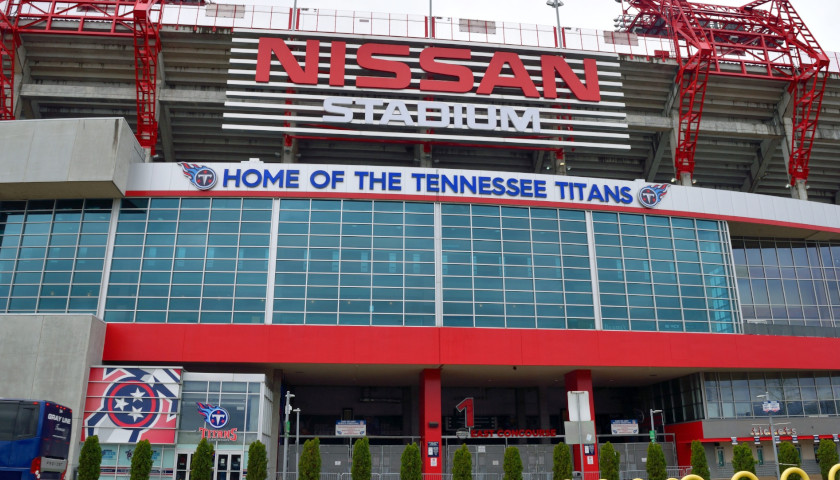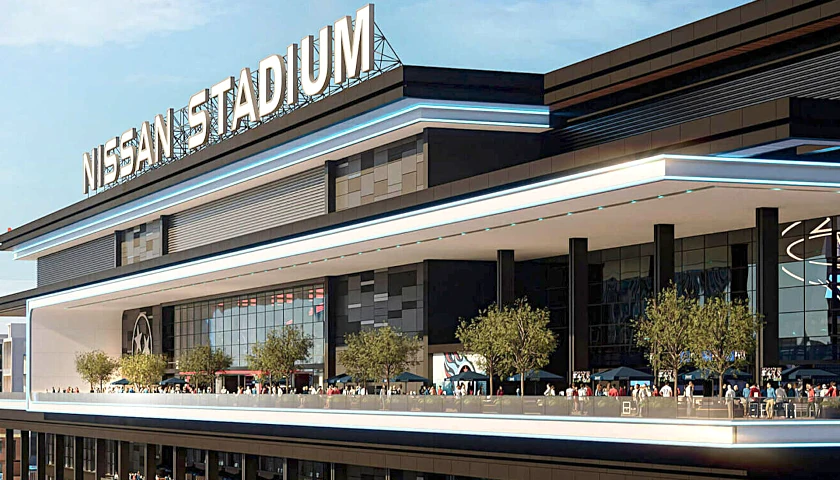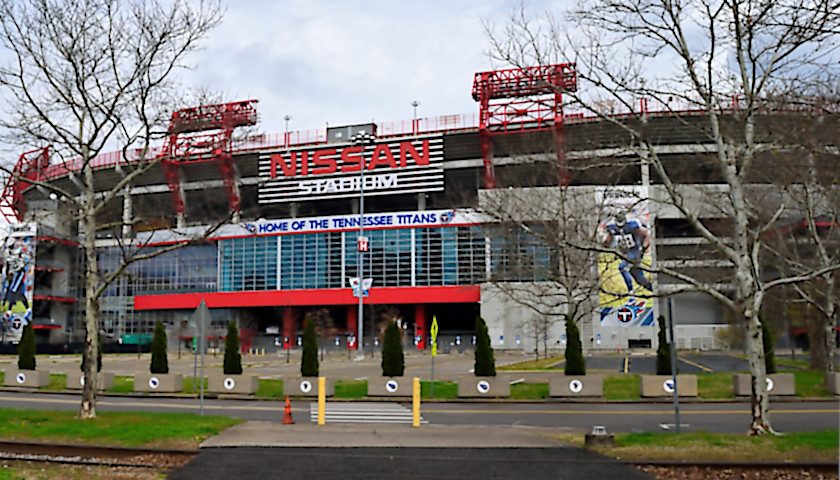At the end of the November 7 meeting of the East Bank Stadium Committee, a representative for the Tennessee Titans came forward and agreed to make public a plan to renovate Nissan Stadium developed on behalf of the team that Mayor John Cooper’s office has claimed is “proprietary.”
After questioning by several of the committee members, James Weaver, partner at Waller, Lansden, Dortch & Davis LP and representing the Titans said the firm would be happy to share the plan with council.
Subsequent to the meeting, eight pages of design drawings came under a cover note from Titans President and CEO Burke Nihill to committee chair Bob Mendes. Nihill explained that the concepts are proprietary to the architecture, design, and planning firm, Gensler, but that the Titans have a license to share them.
The plan for the eighth meeting of the specially formed Metro Council committee on November 7 was a presentation by Venue Solutions Group (VSG) of its October 31 report. VSG’s 98-page report, developed in conjunction with six industry experts, included a master plan design review, comparable stadium review, and a condition assessment of the existing Nissan Stadium.
The intent of the master plan design component of VSG’s report was to provide an independent evaluation and projected costs of the $2.1 billion Nissan Stadium improvement plan developed by Gensler in December of 2021.
Manhattan Construction, selected to provide price estimates to renovate Nissan Stadium for the VSG report, specified that the company used its historical cost database as well as current pricing from similar facilities such as Raymond James Stadium in Tampa, Florida; Kyle Field Stadium in College Station, Texas; and AT&T Stadium in Arlington, Texas and information from VSG’s 2017 Facility Condition Assessment as well as The Gensler Sports Conceptual Design Package.
In addition to the Gensler plan being “secret,” as several of the council members referred to it, two of the stadiums Manhattan used in its analysis are not listed as comparable facilities in the 1996 lease agreement.
Manhattan also said that its estimate captured costs needed to “a) renovate and update the facility to keep it running for another 20 years, b) brining [sic] up to NFL standards, and c) provide new features to make the facility competitive for hosting major events and making it the “go-to” spot overlooking downtown Nashville.”
The last provision is not one that is included in the current lease, a point Council and East Bank Committee member Sean Parker (District 5) was quick to point out when the VSG report was released.
not in the lease, folks! pic.twitter.com/3KxHrXRXmd
— Siney Denny’s (@SeanForFive) October 31, 2022
At Tuesday’s meeting, VSG Chief Listening Officer and Manager Partner Russ Simons was about 10 minutes into his 30-plus slide PowerPoint presentation when Mendes interrupted Simons, which seemed to set the tone for the rest of the presentation.
Mendes sought to clarify Simons’ statement that of 17 comparable facilities in the NFL, they broke it down into one that they “chose to focus on because of its compatibility with the Titans’ master plan development,” referring to the Gensler plan.
Mendes pressed Simons to confirm that the 1996 lease does not say that Metro is obligated to match all 17 facilities. Simons avoided the question, and instead looked at Metro Legal Deputy Director Tom Cross.
“You told us that you were hired to compare it to the existing lease,” said Mendes. “Did you do the comparing to the existing lease, or did Mr. Cross?” questioned Mendes.
Simons responded that they examined the 17 comparable facilities, and focused on the Hard Rock Stadium in Miami, because it was the latest renovation and the one that is most like the renovation proposal from the Gensler/Hastings plan.
Of note is that though there were several mentions of the Hard Rock Stadium in Miami as the one the VSG happened to land on, what seemed to be carefully avoided was the fact the stadium is one that Titans owner Amy Adams Strunk said she likes.
In an August 2019 interview with Midday 180, “… I don’t want a new stadium,” said Adams Strunk. “But I do like the Hard Rock Stadium.”
Mendes questioned Simons about a quote in the media last week saying that his firm is not qualified to determine what constitutes “first-class condition” as specified in the lease.
Simons said he was responding to what he perceived as a legal definition of first class and, as such, how the proposed renovation plan matches up comparable facilities.
What council members were hoping for and in need of, they shared with VSG, is an evaluation of what is required of Metro under the current lease.
“We’ve got this cost, and we have no idea what’s in the cost, what’s a need and what’s a want – what we’re obligated to and what we want to be nice and shiny and cool. And, so, I think that’s where the breakdown is,” explained Council Member Courtney Johnston (District 26).
“I’m still not quite sure how we arrived at looking at this Titans Gensler master plan instead of the lease and the terms defined in the lease, as sort of our starting point,” said Sean Parker (District 5).
Councilmember at-Large Burkley Allen also asked for a comparison of the bare minimum to the two fancy options.
At the conclusion of the VSG presentation, the committee turned to Cross, who said they had to make a judgement as to what improvements exist at other comparable facilities. To that end, Hard Rock Stadium was selected, in part, Cross said, because it has a certain number of improvements that would appear to make it compliant with the lease, while the Gensler report was chosen because it included the same type of improvements.
To Mendes’ question to Cross as to whether the council can get a copy of the Gensler report, Cross responded, “I was told it is proprietary.”
Several of the council members continued to question Cross about the Gensler plan, including the secrecy surrounding it.
At the end of a series of questions, Councilmember Freddie O’Connell said it was obvious that Cross had clearly seen the Titans’ Gensler report while they had not, and asked if, as a Metro member, he was prohibited from sharing it.
“I am,” responded Cross, to which O’Connell noted, “I think that’s important.”
Johnston said that since they paid nearly $250,000 for a cost assessment to be done based on a secret or proprietary design, it only makes sense that they could see the design that was estimated.
“I don’t know that anybody is going to feel real comfortable with a $1.9 billion cost when we don’t even know what we’re paying for.”
“There’s going to be bullet points within that design that are over and above the requirements in our lease. There’s no question about it,” said Johnston.
Johnston thinks it is imperative that the Titans share the design, and if they had no intention of sharing it, council shouldn’t have spent the money to have the cost estimate done.
“This body would have never approved a $200,000 allocation to get a cost estimate on a design that we can’t even see. Never in a million years. There’s not one of us in here. All 39 of us would say you gotta be crazy. So, the fact that that was pulled sort of, that was a little bit of a trick show done, makes me mad, number one, but also it just speaks to how this whole process has really sort of been done backwards and, in the name of transparency, has not been transparent at all,” Johnston concluded.
Councilmember at-Large Sharon Hurt said she has found the Titans to be more transparent, in apparent contrast to the mayor’s office, and suggested that someone from or representing the Titans might speak to the design and provide the Gensler document.
Weaver, who in addition to the Titans represents PSC Metals, Comcast, Pat Emery and Bridgestone Americas, and the Nashville Soccer Club, was described by Nashville Business Journal as having become the most powerful lobbyist in Nashville, came forward and agreed to provide the plan.
“We’re, of course, happy to share the Gensler master plan with council. We’ll do so tonight or tomorrow. We were asked to provide it to the consultant and we did. And that’s who we’ve been asked to provide it to. We haven’t been asked to provide it to anyone else. It became relevant when the consultants started their work. We, obviously, want to be completely transparent. Happy to share it. Happy to have it reviewed. I think it will help answer some of your questions, but I’m not here to advocate, I’m just here to tell you there’s no hiding the ball. It is a document our client hired the firms to do, but we’re happy to share it, given the consultant has relied on it, and happy to answer any questions on it at the appropriate time.”
Mendes asked for clarification that this was the first time that anyone in Metro had asked for the Gensler document. Weaver eventually responded that, with all due respect, he wasn’t going to participate in any sort of “gotcha.”
The full video of the November 7 meeting of the East Bank Stadium Committee can be watched here.
– – –
Laura Baigert is a senior reporter at The Star News Network, where she covers stories for The Tennessee Star.






Agree whatever Titans want to pay for. No Taxpayer money period.
Amazing (not really) that the consulting firms never seem to adhere to what is required but rather use pie-in-the-sky comparisons and pipe dreams from the architects and potential developers. I am not a Medes fan, but I appreciate his attempt to discover (reveal) the bias in the proposals. The city should tell the Titans and the consultants to pound sand until they come up with a fair and unbiased proposal.
Whatever the Titans can afford.